Kissing Books: The grammar of preference
Every month, Olivia Waite pulls back the covers, revealing the very best in new, and classic, romance. We're extending a hand to you. Won't you take it? And if you're still not sated, there's always the archives.
When I was in grad school, I used to give my brain respite by searching for academic writing on the subject of romance novels. The field was almost on the cusp of a major blossoming — IASPR was still but a mote in a tipsy scholar’s eye — but there were still the occasional riffs on Modleski or Pamela Regis or such to offer a palate cleanser for what was otherwise an unrelenting parade of dry literary dudeliness.1 These searches were often complicated by the fact that “romance novels” and “Romance languages” are not at all the same topic in English2, so I’d have to wade through pages of search results with articles about magical realism in South America or French medieval poetry before I found anything talking about, say, Orientalism in sheikh romances.3
Romance itself tends to be a space where people are eager to create new languages — the grammars and guidelines we build and tear down and rebuild around the communication of affection, attraction, and alliances. The language of the fan. Flower meanings. Acrostic jewelry. Modern hanky codes, as we see in one of this month’s books. Rainbow flags in all their infinite variations. Phrases and acronyms invented for personal ads and dating sites and subcultures across the sexual spectrum: BBW and W4W and DTF.4 Is there someone you hire to mediate between you and a potential spouse? Do you have to use oblique terms when flirting because your preferred style of relationship is illegal or stigmatized? Do you have an unusual kink or a complicating condition that requires further precise explanation, preparation, negotiation?
Every culture, subculture, and new generation reinvents words to help people sort out their mutual attractions and dealbreakers. Which is part of what makes researching the history of gender and sexuality so complicated: which of the women-dressing-as-men did it as a disguise, and which did it because they were expressing what we’d currently call transness?5 It’s also what makes the subject so often delightful, as with brilliant Whores of Yore, whose Twitter feed posts vintage pornography and outdated, often hilarious sexual slang along with firebrand posts about sex work through the centuries.
So maybe this is all a contributing factor for why romance readers are uniquely descriptive when talking about their genre. Romance readership has heightened audience awareness of preferred tropes and plot dynamics. Where a fantasy reader might ask, “Anyone know any good recent books with dragons in?”, romance readers will write you out a recipe: “I’m in the mood for contemporary enemies-to-lovers, low angst, bonus points if it’s by an author of color. No small towns, please.” And chances are high someone will swiftly find that book for you!
It’s a lot like the kind of specifics you have to delve into when you practice thoughtful BDSM: what do you want, what are you neutral about, what do you actively want to avoid? I wonder if it’s because romance demands vulnerability from its readers. Romance novels want to make you feel things, but to do so you have to let them in. So readers developed a grammar of preference, hard stops, vulnerability, and consent both granted and denied (DNF is absolutely a revocation of consent).
This month’s books are a kinky poly queer novella, a gaslamp fantasy f/f, a contemporary second-chance romance, Beauty and the Beast with Vietnamese-inspired dragons, and an Antarctic romantic thriller with polar geography terms I was delighted to get to look up the definitions for (séracs and sestrugi!). In all of them, language becomes a key method of solving problems, and bridging the gap between people in love.
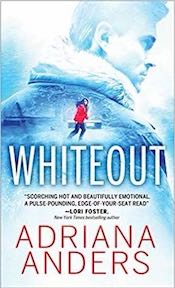
Whiteout by Adriana Anders (Sourcebooks: contemporary m/f):
This book makes an excellent argument for the existence of the Arctic Gothic in literature. Or Antarctic, since the setting here is the bleak and icy expanse that surrounds the South Pole.
See also: the beginning and ending of Frankenstein; Aurorarama; memoirs by Perry, Scott, and Shackleton; The Terror; and those parts of Kavalier and Clay where Josef joins the army and is stationed in the snowy wastes. Just to name a few. The poles and their eeriness have long been a backdrop for stories of survival, about primal conflicts and elemental struggles. Things that are pedestrian events anywhere else in the world are transmuted into terrible omens: halfway through this book I gasped audibly because Oh my god, the sun was setting.
It is a sublime setting for a sublime romantic thriller.
Ford Cooper is a longtime Antarctic researcher drilling ice cores: ex-military, closed-off, unreadable, possibly neuroatypical (sensory issues read that way to me). Angel Smith is a summer cook and a hot mess, who isn’t supposed to be staying over winter. But as things go wildly, muderously wrong, the two of them end up on a cross-continental trek for their lives. Pursued by enemies, fighting a persistent attraction, their supplies dwindling,
One thing I most appreciated, very spoilery: the longer the story goes, the less Angel needs rescue, and the more rescuing she gets to do. Romantic thrillers with military men are seriously prone to damselling; one reason why I tend not to read so many. But this book sets up its character arcs and then sticks to them—and the character who confronts Antarctica is Angel. Coop’s comfortable on the ice; he finds the loneliness and cold a refuge from people and experiences he’s trying not to think about. His arc is internal: he has to come to terms with the idea of loving someone, of risking his heart, of being open and knowable. As Coop gets more and more vulnerable, he begins throwing himself at danger to protect Angel—and getting gravely injured in the process. Which means Angel ends up doing a great deal of the rescuing and avenging, in the end, in ways that for once don’t feel martyrish or self-sacrificing. It’s glorious to see: we go from an ice giant/fragile rookie dynamic to lovelorn bodyguard/petite assassin, and I couldn’t be more delighted by it.
For one strange, discomposed moment, Coop saw himself, in his red NSF-issued coat, as a solitary drop of blood in the middle of all this vastness. If he wasn’t careful, he’d get soaked up by the ice, by the ground itself. Not eaten so much as absorbed, covered, layered over, forgotten until some enterprising researcher with a drill chose this particular spot to study.
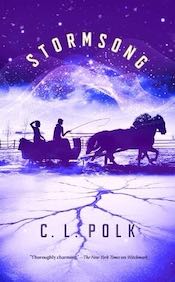
Stormsong by C. L. Polk (Tor.com: historical fantasy f/f):
Remember last year when a queer historical fantasy romance won the World Fantasy Award? I sure do! I’ve been waiting for this f/f sequel to one of my top m/m reads ever since. You’re definitely going to want to read the first book first, but there’s something truly pleasing in seeing one book set an epic number of pins up, and then having the second come along with a baseball bat to swat them all back down.
The beginning of this book is a mess. And no wonder, the way we left things. Witchmark tore down a kingdom’s whole power supply because it was the moral thing to do. Now a frightful storm is bearing down on a shattered kingdom: power is out and the government is in shambles and the people grow restless and threatening. Grace Hensley is trying her best to protect everyone, but she is beset by divided loyalties—to the truth, to her country, to her rebellious brother and her treacherous father and a stubborn queen unwilling to face reality.
And the bold, beautiful journalist who knows too many secrets, and who can send Grace’s whole delicate spun-sugar future tumbling down with a single stroke of the pen.
Witchmark was focused on taking out the physical system; Stormsong is about how difficult it is to change the system of how people think and plan and govern. Very hard, turns out! It takes a while for the book to start tying threads back together but when it does, wow. It is a little heavier on the fantasy side than on the romance side, balance-wise—but that’s a minor quibble from my romance-craving heart. Hopefully we get to see more stories set in this world, because I can’t wait to see what happens next.
She studied a point below my chin. “You’re rumpled.”
“I am?” I froze as she raised her hands and flipped up the collar of my shirtwaist, her fingers gliding around my neck. She felt all around my tie, pulled gently on the silken knot, and resnugged it. I stood absolutely still, riveted to the intent look on her face as she folded my shirt collar down and smoothed it over the neck of my knitted vest. She concentrated on her task, fussing over the lay of my lapels. She stroked her fingers along my shoulders and then looked up, her dark eyes sparkling over a gentle smile.
“That’s you put to rights.”
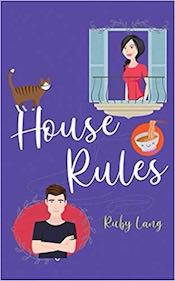
House Rules by Ruby Lang (Carina Press: contemporary m/f):
“She hadn’t seen Simon for years, and he was as handsome as ever, the asshole.”
Welp, there it is: how to fall in love with a book in one first-chapter sentence. This third entry in Ruby Lang’s Uptown series feels even more exquisitely crafted than the first two, and god help me but I want to start drawing careful, detailed floor plans of all these apartments as an act of fannish homage.
Here is the bathroom: where ex-spouses of seventeen years Simon Mizrahi and Lana Kai sit awkwardly on the side of the tub and agree to be roommates, because the apartment Lana found is a two-bedroom that’s too beautiful to pass up.
Her bedroom: where Lana curls up in the dark because endometriosis is a cruel bitch, and Simon, not knowing why she’s ill but worried sick, letting her tug him into the sheets to keep her warm as they both sleep.
The kitchen: where they kiss for the first time again, and it’s not quite how it used to be because both of them have changed over seventeen years.
Their romance is not an easy one, but it has a weathered, poignant beauty that feels all the richer for the difficulty. Simon gets in loops of self-sabotage but also a keen sense of transcendent joy. Lana has a habit of cursing hardest when she’s most sentimental that is just such a chef’s kiss of a character trait I could perish from envying it. It’s a romance about two people with shared baggage, who have to relearn how to talk to one another.
This book gives me my favorite thing in the book world: seeing a great author get even better.
He closed his eyes. “You know why this is a bad idea—no, it’s not just one bad idea. It’s several bad ideas rolled into one large column of highly suspect ideas supporting a sign that reads, BAD IDEA.”
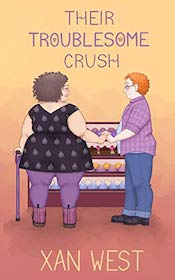
Their Troublesome Crush by Xan West (self-published: contemporary demi queer trans m/queer cis f):
I dug a little ways back into my To Be Read list for this kinky, poly novella where two metamours develop feelings for each other while planning their partner’s birthday party. It’s a light conflict, extremely talky novella, where language is absolutely everything. Communication, community, self-realization, song lyrics, parsing out various types of attraction, polyamory, kink consent and negotiation, it’s an amazing amount to pack into a short story space.
Our POV character is Ernest, an autistic, demiromantic, kinky, poly, Jewish trans man—and every one of those aspects impacts the story’s events. Ernest is an absolute dear, with an interior voice that goes in spirals just as charmingly tight as his red curls. This can be disorienting, for him as well as the reader, so it’s no surprise he finds himself drawn to Nora’s calm, steady presence. Romances are about balancing internal and external events: this one is a deeper internal POV than many, so Ernest’s identity with its multiple aspects becomes the landscape the reader navigates as the plot progresses.
It reminds me of that classic example of English adjective order: a lovely little old rectangular green French silver whittling knife, opinion-size-age-shape-colour-origin-material-purpose-noun. English speakers follow this rule automatically, without having to think about it: they are deep enough in the language to know what sounds right, and will be comprehensible. But it’s incredibly difficult for people just learning the language. I think the term I’m looking for here is: this book is identity-forward—not just in how detailed it is about the characters’ identities, but in putting the particular strengths and sensitivities of each person at the forefront. Everyone is navigating their own internal complexity while carefully making room for other people’s full humanity. It feels beautifully kaleidoscopic, but may be dazzling for readers used to looking at the world through a single lens.
Nora was coming over, and he was nervous. He shouldn’t be nervous. There was no reason to be nervous. Judith’s idea that he had a crush on Nora was ridiculous and made no sense and he wasn’t going to think about it. If he was nervous, it wasn’t about seeing Nora. It was because they were planning for Daddy’s birthday and he wanted to do a really good job.
This Month’s Beauty and the Beast, But Make it Sapphic and Southeast Asian
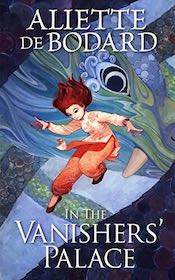
In the Vanishers’ Palace by Aliette de Bodard (JABberwocky Literary Agency: fantasy f/f):
Beauty and the Beast is one of Romancelandia’s most persistent patterns, partly because it is so adaptable. This version is a dark Vietnam-inflected fantasy, with Vu Côn, a beast who is a dragon healer, and Yên, a beauty who is a scholar sacrificed by the elders of her village. The power difference between them is enormous: immortal over mortal, spirit over human, terrible knowledge over innocence.
But there are other powers at work: the Vanishers, who broke the world, who continue to break it even after they’ve departed. And love, of course, that greatest and least predictable of forces.
The language of this book is fascinating—the characters are speaking Viêt (or something like it), so in a very real sense we are reading in translation. For example, the characters mention “filial piety,” but the narrative points out that the character had only spoken a single word. Combine that with careful attention to various pronouns (he/she/neutral they) and addresses that use kinship terms and shift with changes in fear, power, and intimacy ... It does more to show political and social nuances than a lot of doorstop high fantasies do. This along with a surprisingly powerful romance between two stubborn, closed-off hearts—it makes for a book that’s lush, gorgeous, heartbreaking, and profoundly memorable.
It had been a long, exhausting day. Alone in front of her mirror, Vu Côn undressed, slowly. She was winding down, no longer bothering to maintain one shape. Her hands shifted to claws and back again, half-tearing clothes that the palace would repair in the night, and her skin was becoming dotted, here and there, with iridescent scales. She stared, for a while, at the shadow of antlers at her temples.
-
For instance, the textual studies class that asked us to compare two versions of a single text of our choice and write a descriptive bibliography comparing the differences. I chose Jonathan Franzen’s essay “Perchance to Dream”/“Why Bother?” because it was the only thing I could think of that had two different official versions and was shorter than a novel. In the process of looking closely at what Franzen changed—eliminating predictions that hadn’t panned out, cutting material that mentioned his wife/ex-wife—I went from admiring him as a writer and finding him insightful to realizing he was everything I was fighting against in all of patriarchal literature. The flame of this particular grudge has ever since been a small perennial pilot light in my soul. ↩
-
If you’re looking for overlap between romance novels and Romance languages, two resources I’d highly recommend are Word Suitcase by Felicia Davin and Charlotte’s new and excellent Close Reading Romance blog. ↩
-
Orientalism, sheikh romances, and the War on Terror is at present one of the most interesting developing threads in the scholarship. Start with Stacy Holden’s classic article and then read Laura Vivanco’s monograph review. ↩
-
Imagine the Venn diagram of “people who know what Sadie Hawkins means” and “people who know what sounding is.” ↩
-
There is Gosh we can never fully know the past, and then there is The past is what I say it is no matter how many present-day people it hurts. Here is one example of the latter in regard to famed 19th-century surgeon Dr. James Barry. ↩